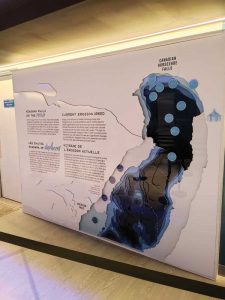
The shop focuses on custom and experiential fabrication for tourism, hospitality, retail, and municipal clients, with a specialization in architectural signage.
SMC: How much of the sign installation process is handled in-house?
CL: This has always been a challenging aspect of our business, and the answer has varied from year to year. We try to handle installations in-house as much as possible, because after all, they can be between 85 and 90 per cent of what a client sees of the entire project. After the sales process, the client is not likely to make many trips into the shop to check in. Yes, they will see progress photos, but to them, the incremental progress is pretty invisible. With this in mind, we only relinquish about 10 per cent of our overall installations to subcontractors, with the very clear understanding they represent Custom Sign Lab and not themselves while on-site. We treat our core team like a family, and we pride ourselves on all aspects of what we do, which also carries over to our subcontractors’ work.
SMC: What tools/equipment do you currently use to complete your projects?
CL: We use a whole arsenal of electric and hand tools during the fabrication process, but our day-to-day operations are most heavily supported by a Mimaki CJV300-160 Plus printing/cutting machine, running SS21 inks; a 1,651-mm (65-in.) roll-to-roll laminator; a 1.2- x 2.4-m (4- x 8-ft) Basic HD CNC router table; and an 80-watt Rabbit Laser 1390 CO2 cutter/engraver.
SMC: What are some of the steps involved in your planning process?
CL: Our planning process depends on the client. We still serve a lot of small and medium-sized businesses, so planning for them would involve an initial consultation; the development of a project scope, budget, concept, and estimation; review of the estimation and refinement of the concept; and approval. We would then progress into elements such as permitting, fabrication, and installation. It can take a long time to move through it this way.
For a larger company, or an architectural firm, we would generally co-develop a production concept/scope based on existing renderings and ideas, and then move swiftly through pricing and directly into fabrication and installation. When existing permits and client expectations are once removed, as they are with the relationship between an architectural or millwork firm and CSL, the process has the ability to be more creativity driven and move swiftly to completion.

To execute sharp, dimensional projects, the shop uses a 3D-carving computer numerical control (CNC) router, paired with custom-sculpted 3D artwork, aided by a 3D scanner.
SMC: How is technology changing the business?
CL: I wouldn’t necessarily say technology is changing our business, but it’s driving us to be more creative thinkers, and it always has. We’ve always tried to adopt new technology to replace old methods, even when creating traditional-style signage. Technology has the ability to cut down production time, so we can focus on other goals or increase output. There’s a lot of fear of new technology such as artificial intelligence (AI) taking copywriting and design jobs, or robots replacing line workers, but the nature of our shop insulates us from this concern. We have a commitment to real people building real relationships and creating real things. This perspective opens us up to consider emerging technology as an asset, not a liability. We try to focus on allowing machines to execute elements of projects we simply can’t produce with the same degree of accuracy or detail, and then develop processes which let our team focus on aspects of projects that require a uniquely human touch.
SMC: What is the key to staying successful in this industry?
CL: For us, it’s a constant reinvention of the way we think about solving problems and a dedication to expanding and sharing knowledge. We nurture experimentation and self-improvement in our team and empower everyone at Custom Sign Lab to create solutions on their own without managerial intervention. Encouraging this freedom and empowerment ultimately leads to a more effective team, as well as products that are made to a higher level of quality and meet and exceed our standards. Leadership at Custom Sign Lab also subscribes to the perspective of being highly coachable. We’ve had business coaches since 2021, and I think it’s something very few people in this industry are doing or talking about. The highest performing athletes in the world all have coaches for a reason. For us, we’re always striving to improve, and it’s helping with the structure and strategic growth of Custom Sign Lab, as well as keeping us accountable to someone other than our clients—which is resulting in transformations in not only our mindsets, but also our relationships and products.
SMC: What are your future plans for the growth of the business?
CL: For the foreseeable future, Custom Sign Lab is diligently focused on strategic and exponential growth which highlights our core competencies and upholds our core values. We want to be a business that supports other businesses, small and large, and ultimately, we want to build and fabricate the most beautiful, functional, experiential, and exciting products inside and outside of the sign industry.





